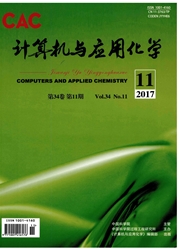

 中文摘要:
中文摘要:
基于遗传算法(genetic algorithm,GA)的变量筛选和支持向量机(support vector machine,SVM),提出了一种改进的定量结构一性质相关(quantitative structure detonation relationship,QSPR)建模方法——遗传-支持向量机(GA—SVM),并用其建立含能材料的定量结构-爆轰性能关系(QSDR)模型,此外还应用标准SVM方法建立了QSDR模型,并用这2种模型进行呋咱系含能化合物密度的预测,随机选取85%化合物作为训练集,用来建立模型,其余化合物作为测试集来测试模型的预测能力。预测结果的交互检验的相关系数平方分别为0.9887和0.9885,平均相对误差分别为1.16%和2.12%,表明了2种建模方法的有效性。通过对2种模型的预测能力进行比较,GA-SVM方法建立的QSDR模型能更好地预测呋咱系含能化合物的密度,更利于实际应用。
 英文摘要:
英文摘要:
A modified method to develop quantitative structure property relationship (QSPR) models was proposed based on genetic al- gorithm (GA) and support vector machine (SVM) (GA-SVM). GA was used to perform the variable selection, and SVM was used to construct QSPR model. GA-SVM was applied to develop the quantitative structure detonation relationship model for energetic materials. The standard SVM was also utilized to construct QSDR prediction models, 85% of the whole date set were taken as training set to construct the model, the rest compounds were used to test the prediction ability of the model. The cross-validation correlation coefficient Rcv^2 is 0. 988 7 and 0. 988 5, and the mean relative error is 1.16% and 2. 12% , for the prediction results respectively. It demonstrates the validity of these two methods. By comparison the stability with prediction ability of the models, it was found that GA-SVM is the optimal method for developing QSDR model for predicting the density of furazan compounds.
 同期刊论文项目
同期刊论文项目
 同项目期刊论文
同项目期刊论文
 Observation of nicotinic acid in nicorandil samples and simultaneous determination of nicorandil and
Observation of nicotinic acid in nicorandil samples and simultaneous determination of nicorandil and Determination of puerarin in pharmaceutical injection by flow injection analysis with acidic potassi
Determination of puerarin in pharmaceutical injection by flow injection analysis with acidic potassi Application of multivariate curve resolution-alternating least square methods on the resolution of o
Application of multivariate curve resolution-alternating least square methods on the resolution of o Sensitive determination of nanogram levels of diacerein in a pharmaceutical formulation by flow inje
Sensitive determination of nanogram levels of diacerein in a pharmaceutical formulation by flow inje Application of multivariate curve resolution-alternating least square on analysis of hyphenated-inst
Application of multivariate curve resolution-alternating least square on analysis of hyphenated-inst 期刊信息
期刊信息
